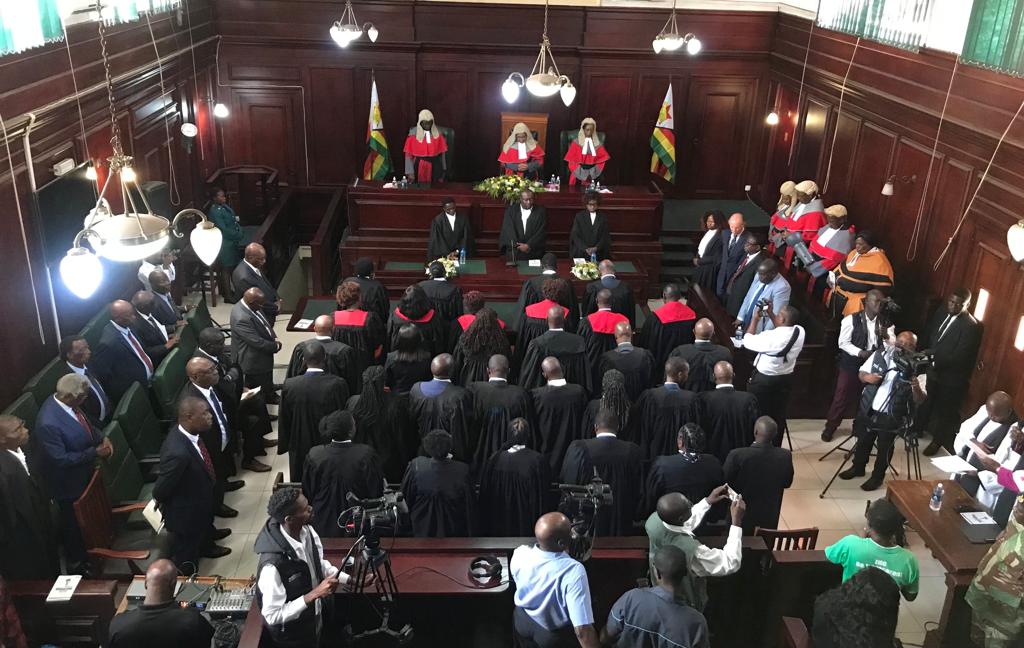To maintain the public’s confidence in the judiciary, judges and magistrates must adhere by the constitution while their conduct must remain lawful and beyond reproach at all times, according to deputy Chief Justice Justice Elizabeth Gwaunza.
Speaking at the official opening of the legal year 2024 at the Bulawayo High Court on Monday, Justice Gwaunza said the judiciary joined Zimbabwe in celebrating the 10th anniversary of its current Constitution promulgated on May 22, 2013.
Justice Gwaunza said the judiciary system had a role in entrenching constitutionalism in order for Zimbabwe to preserve a just and democratic society based on openness where people’s rights are protected and the government is answerable to the people.
“The Constitution is the bedrock of constitutionalism. It imposes objectives and standards by which the operations and conduct of the Executive, the Legislature, the Judiciary and the other agencies of the State are measured,” she said.
“The Judiciary shoulders the duty, at individual and institutional level, to act in the manner that is prescribed by the values and principles embodying the standard of the conduct prescribed by the Constitution.”
Justice Gwaunza said the duty to interpret the law is imposed on the Judiciary and the public offices of justice developed for this purpose are a reflection of the commanding nature of the Constitution.
“This is because the Constitution not only creates the duty and the offices but also prescribes the manner and timing of exercising the powers that it gives. It also prescribes the remedies for failure to act constitutionally,” she said.

That understanding is consistent with Section 3 of the Constitution, which states Zimbabwe is founded on respect for the supremacy of the law, the rule of law, fundamental human rights, and the diverse cultural values, according to Justice Gwaunza.
Justice Gwaunza also stated “no individual or entity is above the clear demands of the Constitution” as it sets the tone and standards of the required conduct and performance whilst fostering a culture of compliance.
“The feature of constitutions providing for fundamental aspects of creating a legal order gives constitutions their relevance in the present and the future,” she said, adding if one wondered why the Judiciary has set out to achieve this “ambitious objective,” the answer was the role of the Judiciary as an arbiter of justice.
“This is the exercise of the authority derived from the people in terms of Section 162 of the Constitution, is to foster compliance with the Constitution. The core reason for the Judiciary’s establishment is to be the final port of call regarding the interpretation of both ordinary statutes and the supreme law of the land.”
Justice Gwaunza noted that an effective Judiciary is one that is cognisant of the importance of constitutionalism.
“It must be able to perceive threats to the expected constitutional standards of behaviour imposed on everyone. By interpreting and applying the law without discrimination and in a transparent manner, the courts ensure that the fundamental role of the Constitution as the driver of a just, harmonious and peaceful society is fulfilled.”
Justice Gwaunza remarked that the relationship between the Judiciary and the Constitution is a dynamic and evolving process because courts are both a creation of the supreme law and its custodian.
“On the one hand, the courts have procedural and substantive laws that guide their operations in the exercise of the judicial authority; yet, on the other hand, the courts are ultimately responsible for preserving the sanctity of the supreme law. Thus, the courts by committing to and operating in compliance with the values and the standards of the Constitution are actively entrenching constitutionalism.”
The deputy chief justice noted that the public is at the epicentre of the existence of the Constitution and its established procedural and substantive mechanisms for fostering compliance with its fundamental values and principles.
This means the society must feel protected by the Judiciary’s adherence to the concept of constitutionalism, said Justice Gwaunza and added that “even those who are engaged in acts of lawlessness must feel that the courts, when administering the justice they deserve, are acting in a manner that reflects a consciousness of the overarching supreme command of the Constitution.”
This is why “judges and magistrates must be agents of constitutionalism through observance of the principles that guide the Judiciary in terms of sections 164 and 165 of the Constitution,” said Justice Gwaunza.
“Judicial officers are the gatekeepers of the Constitution. It is therefore imperative that their conduct remains lawful and beyond reproach at all times. It is the only way that the public will retain confidence in the Judiciary,” she said.
Should the conduct of judicial officer be be reproachable and violates the provisions of the Constitution or the Judicial Code of Ethics in the case of Judges and the Judicial Service Regulations and the Magistrates Code of Ethics in the case of magistrates, Justice Gwaunza said the relevant disciplinary measures will be invoked.
“It is regrettable and unfortunate that over the years, including the year under review, the Judiciary lost Judges and magistrates pursuant to the invocation of mandatory disciplinary measures necessitated by the doctrine of constitutionalism,” said Justice Gwaunza, buttresiing that the Judicial Services Commission (JSC) will not shy away from enforcing and entrenching the constitutional obligation.
Justice Gwaunza also urged every citizen to join the celebration of the tenth anniversary of the current Constitution because “everyone has a role to play in the entrenchment of constitutionalism by obeying the express commands of the Constitution.”
“The pursuit of constitutionalism is a call on all people to seek to always conform to the constitutional order. Only then can the nation continue to enjoy the unity, peace, economic development and achieve the social justice it deserves.”

